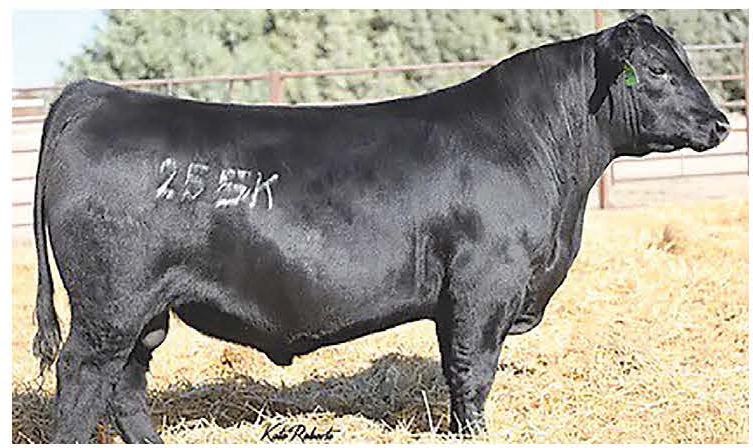Nestled on the plains of north central Kansas, roughly halfway between Denver and Kansas City, Ferguson Angus has stood proudly since 1946 in Phillips County. The family-run operation, owned and run by Lynn and Lori Ferguson as well as their nephew and his wife, Brice and Vicki Korobka, breeds registered Angus cattle and raises corn, wheat, soybeans, alfalfa, grain sorghum, and forage sorghum.
“Ferguson Angus is a family operated farm and ranch who love to grow great crops and the best black Angus that genetics, technology and the environment allows,” Lynn Ferguson said.
Pictured above is Ferguson Outpace.
While the operation was started by Lynn Ferguson’s parents, Ferguson bought his first registered Angus cattle in 1972 and hasn’t looked back. In the early 1980s, he started an AI program, which he continues to run today.

Data crucial in operation
Ferguson is a self-described numbers guy, with data playing a key role in his operation. “I have been very excited about the Angus GS data that DNA generates and the value and accuracy it adds to the performance EPDs,” he said. Angus GS is a genomic selection tool from Neogen, built specifically for Angus cattle in partnership with the American Angus Association.
Ferguson’s selection process isn’t something he takes lightly, and the Angus GS data is just one small part of it. The first two selections of the sale bulls are done during weaning. Ferguson, along with his wife and nephew, assesses each and every bull both visually and on the scale. If any of them determine the bull doesn’t meet their rigorous standard, it’s culled. After weaning, they end up with an average of about 140 bulls out of 250 possible prospects.

Eye test matters, too
After a few weeks, the family walks the pens and makes a second cut, strictly using visual appraisal. Ferguson looks for general eye appeal, thickness, length, feet and leg structure, and disposition, among other traits.
During the weaning process, DNA is collected on every bull. Those that remain after the first two cuts have their DNA sent to AGI for genomic evaluation. Once the information is returned, the family goes through the bulls a third time before finally registering those that make the cut. Once registered, each bull’s EPD gets pulled up online for evaluation. Those not meeting Ferguson’s EPD criteria are then culled as are those who don’t measure up at yearling weigh time.
“The fact is, our selection process goes up to and through for penning process the morning of the sale,” he said, referencing his annual bull sale.
Success story
Select Sires has previously purchased two bulls, Ferguson Breakout and Ferguson Trailblazer. Semen from both bulls is sold both domestically and in international markets. Bulls at Ferguson Angus are developed with a high roughage ration, promoting longevity and soundness. They are never fed creep feed. They’re bred for carcass merit and feedlot excellence, early growth and calving ease.
Ferguson Angus cows and heifers are synced up using the seven and seven protocol, and every female is artificially inseminated. Older cows are calved at a property along the Solomon River with plenty of evergreen trees, sandhills covered with tall grass, sunflowers and 5- to 7-foot tall kochia providing excellent protection from the elements. “That combined with the excellent mothering ability of a good Angus cow makes for a successful calving season,” Ferguson said.
The 34th annual Ferguson Angus bull sale will be March 26. Ferguson Angus sells about 100 bulls each year. Bulls selling at the annual sale this March are predominantly sired by Trailblazer, Ball of Fire, Surpass, Rawhide, Thedford, Breakthrough, and Papa 0100.
The upcoming 2024 calf crop that is due next spring will have many progeny from Ferguson Outpace, all of Fire, Jameson, Trailblazer, Craftsman, Surpass, Rawhide, and Thedford.
For more information, call Lynn or Lori Ferguson, at 785-476-5345 or Brice or Vicki Korobka at 785-533-1530, or visit FergusonAngus.com.




